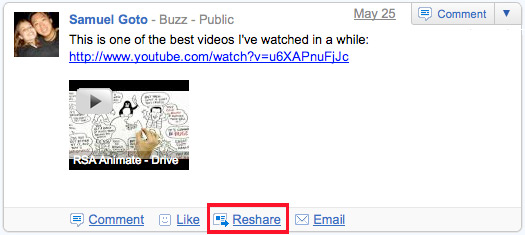Google is starting to make some significant moves that may give Google Buzz a significant boost. For example, this week, a "Reshare" button was announced. This is essentially Google’s version of the retweet. If you follow a Buzz user who posts an interesting update, you can hit the "reshare" button (down with the comment, like, and email buttons) to repost that post to your own Buzz stream.
Will new features fuel Buzz growth? Comment here.
Reshare only works for public posts. Private posts will not have the reshare link. However, you can reshare posts yourself publicly or privately. If a lot of people you follow reshare the same post, the similar posts will be collapsed.
"You’ll notice that resharing creates a new post, effectively forking the conversation. To fork or not fork was a decision we debated for a while," says Buzz software engineer Sam Goto. "Ultimately, we think forked conversations help create more varied, intimate discussions around a single item. We realize people may want a non-forking version too, so we’re thinking about how to do that as well."
"When there is a chain of reshares, the names of all of the people who publicly reshare the post appear on the original item, even if they’re not directly connected to the original author," Goto explains. "If you share something that ends up getting passed around by lots of other people, it’s pretty cool to see that."
It’s also worth noting that you can "like" a reshare, and that will not translate to a "like" for the original post. This means you can like a comment without liking what the comment is about.

Google also announced that it’s releasing an XHTML version of the Buzz website which can be accessed from many mobile devices like those running Android pre-2.0, Blackberry, Nokia S60, and Windows Mobile. This could go a long way for getting Buzz used by mobile users across a broader range of devices.
Google Buzz launched earlier this year to a great deal of hype – and why not – a potential Facebook/Twitter competitor from the giant that is Google – but much of the "buzz" about Buzz has faded in the months since. In fact, most of the discussion in the media about Buzz has been centered around privacy issues (though that has become considerably less rampant…Facebook has filled that role nicely).
As we’ve been saying since long before Buzz was announced, the key to a Google social network offering is in the integration with its other products. This made launching Buzz within Gmail seem like a smart move, but there is still much work to be done if Buzz is to become a real player in the space.
Adding features, such as the reshare feature is a start, but what may have a more significant impact was an announcement that came last week.
During Google I/O, I attended a session in which Google quietly announced the launch of the Buzz API. The news was generally overshadowed by other Google announcements, such as the unveilings of Google TV and FroYo, but with developers getting access to the Buzz API, there is room for much to be done around the service in terms of third-party apps, which should ultimately make Buzz much more useful. That’s what happened with Twitter. Developers like TweetDeck, Boxee, Buzzzy, Klout, Meebo, Seesmic, Vinehub, Shareaholic, and other have already taken advantage of the Buzz API.
It’s hard to say if the general public will find a real need for Buzz alongside Facebook, Twitter and other services, but as Google grows its presence in mobile via Android, and soon into television via Google TV, there will be more potential gateways for Buzz adoption, as well as integration.
Is Buzz headed in the right direction? Do you think Buzz use will explode? Share your thoughts.




 WebProNews is an iEntry Publication
WebProNews is an iEntry Publication